#( &. ovid )
Explore tagged Tumblr posts
Text

― Ovid, Metamorphoses
13K notes
·
View notes
Text
The truth about Medusa and her rape... Mythology breakdown time!
With the recent release of the Percy Jackson television series, Tumblr is bursting with mythological posts, and the apparition of Medusa the Gorgon has been the object of numerous talks throughout this website… Including more and more spreading of misinformation, and more debates about what is the “true” version of Medusa’s backstory.
Already let us make that clear: the idea that Medusa was actually “blessed” or “gifted” by Athena her petrifying gaze/snake-hair curse is to my knowledge not at all part of the Antique world. I still do not know exactly where this comes from, but I am aware of no Greek or Roman texts that talked about this – so it seems definitively a modern invention. After all, the figure of Medusa and her entire myth has been taken part, reinterpreted and modified by numerous modern women, feminist activist, feminist movements or artists engaged in the topic of women’s life and social conditions – most notably Medusa becoming the “symbol of raped women’ wrath and fury”. It is an interesting reading and a fascinating update of the ancient texts, and it is a worthy take on its own time and context – but today we are not talking about the posterity, reinvention and continuity of Medusa as a myth and a symbol. I want to clarify some points about the ACTUAL myth or legend of Medusa – the original tale, as told by the Greeks and then by the Romans.
Most specifically the question: Was Medusa raped?
Step 1: Yes, but no.
The backstory of Medusa you will find very often today, ranging from mythology manuals (vulgarization manuals of course) to Youtube videos, goes as such: Medusa was a priestess of Athena who got raped by Poseidon while in Athena’s temple, and as a result of this, Athena punished Medusa by turning her into the monstrous Gorgon.
Some will go even further claiming Athena’s “curse” wasn’t a punishment but a “gift” or blessing – and again, I don’t know where this comes from and nobody seems to be able to give me any reliable source for that, so… Let’s put this out of there.
Now this backstory – famous and popular enough to get into Riodan’s book series for example – is partially true. There are some elements here very wrong – and by wrong I do mean wrong.
The story of Medusa being raped and turned into a monster due to being raped does indeed exist, and it is the most famous and widespread of all the Medusa stories, the one people remembered for the longest time and wrote and illustrated the most about. Hence why Medusa became in the 20th century this very important cultural symbol tied to rape and the abuse of women and victim-blaming. HOWEVER – the origin of this story is Ovid’s Metamorphoses, from the first century CE or so. Ovid? A Roman poet writing for Roman people. “Metamorphoses”? One of the two fundamental works of Roman literature and one of the two main texts of Roman mythology, alongside Virgil’s Aeneid. This is a purely Roman story belonging to the Roman culture – and not the Greek one. The story of Medusa’s rape does not have Greek precedents to my knowledge, Ovid introduced the element of rape – which is no surprise given Ovid turned half of the romances of Greek mythology into rapes. Note that, on top of all this, Ovid wasn’t even writing for religious purposes, nor was his text an actual mythological effort – he wrote it with pure literary intentions at heart. It is just a piece of poetry and literature taking inspiration from the legends of the Greek world, not some sort of sacred text.
Second big point: The legend I summarized above? It isn’t even the story Ovid wrote, since there are a lot of elements that do not come from Ovid’s retelling of the story (book fourth of the Metamorphoses). For example Ovid never said Medusa was a priestess of Athena – all he said was that she was raped in the temple of Athena. I shouldn’t even be writing Athena since again, this is a Roman text: we are speaking of Minerva here, and of Neptune, not of Athena or Poseidon. Similarly, Minerva’s curse did not involve the petrifying gaze – rather all Ovid wrote about was that Minerva turned Medusa’s hair into snakes, to “punish” her because her hair were very beautiful, and it was what made her have many suitors (none of which she wanted to marry apparently), and it is also implied it is what made Neptune fall in love (or rather fall in lust) with her. I guess it is from this detail that the reading of “Athena’s curse was a gift” comes from – even though this story also clearly does victim-blaming of rape here.
But what is very fascinating is that… we are not definitively sure Neptune raped Medusa in Ovid’s retelling. For sure, the terms used by Ovid in his fourth book of Metamorphoses are clear: this was an action of violating, sexually assaulting, of soiling and corrupting, we are talking about rape. But Ovid refers several other times to Medusa in his other books, sometimes adding details the fourth-book stories does not have (the sixth book for examples evokes how Neptune turned into a bird to seduce Medusa, which is completely absent from the fourth book’s retelling of Medusa’ curse). And in all those other mentions, the terms to designate the relationship between Medusa and Neptune are more ambiguous, evoking seduction and romance rather than physical or sexual assault. (It does not help that Ovid has an habit of constantly confusing consensual and non-consensual sex in his poems, meaning that a rape in one book can turn into a romance in another, or reversal)
But the latter fact makes more sense when you recall that the rape element was invented and added by Ovid. Before, yes Poseidon and Medusa loved each other, but it was a pure romance, or at least a consensual one-night. Heck, if we go back to the oldest records of the love between Poseidon and Medusa, back in Hesiod’s Theogony, we have descriptions of the two of them laying together in a beautiful, flowery meadow – a stereotypical scene of pastoral romances – with no mention of any brutality or violence of any sort. As a result, it makes sense the original “romantic” story would still “leak” or cast a shadow over Ovid’s reinvented and slightly-confused tale.
Step 2: So… no rape?
Well, if we go by Greek texts, no, apparently Medusa was not raped in Greek mythology, and only became a rape victim through Ovid.
The Ancient Greek texts all record Poseidon and Medusa sleeping with each other and having children, but no mention of rape. And the whole “curse of Athena” thing is not present in the oldest records – no temple of Athena soiling, no angry Athena cursing a poor girl… “No curse?” you say “But then how did Medusa got turned into a Gorgon”? Answer: she did not. She was born like that.
As I said before, the oldest record of Medusa’s romance but also of her family comes from Hesiod’s Theogony (Hesiod being one of the two “founding authors” of Greek mythology, alongside Homer – Homer did wrote several times about Medusa, but only as a disembodied head and as a monster already dead, so we don’t have any information about her life). And what do we learn? That Medusa is part of a set of three sisters known as the Gorgons – because oh yes, Ovid did not mention Medusa’s sister now did he? How did Medusa’s sisters ALSO got snake-hair or petrifying-gaze if only Medusa was cursed for sleeping with Neptune? Ovid does not give us any answer because again, it is an “adaptational plot hole”, and the people that try to adapt Ovid’s story have to deal with the slight problem of Stheno and Euryale needing to share their sister’s curse despite seemingly not being involved in the whole Neptune business. Anyway, back to the Greek text.
So, you have those three Gorgon sisters, and Medusa is said to be mortal while her sisters are not. Why is it such a big deal? Because Medusa wasn’t originally some random human or priestess. Oh no! Who were the Gorgons’ parents? Phorcys and Keto/Ceto, aka two sea-gods. Not just two sea-gods – two sea-gods of the ancient, primordial generation of sea-gods, the one that predated Poseidon, and that were cousins to the Titans, the sea-gods born of Gaia mating with Pontos.
So the Gorgons were “divine” of nature – and this is why Medusa being a mortal was considered to be a MASSIVE problem and handicap for her, an abnormal thing for the daughter of two deities. But let’s dig a bit further… Who were Phorcys and Ceto? Long story short: in Greek mythology, they were considered to be sea-equivalents of Typhon and Gaia. They were the parents of many monsters and many sea-horrors: Keto/Ceto herself had her name attributed and equated with any very large creature (like whales) or any terrifying monster (like dragons) from the sea. The Gorgons themselves was a trio of monsters, but their sisters, that directly act as their double in the myth of Perseus? The Graiai – the monstrous trio of old women sharing one eye and one tooth. Hesiod also drops the fact that Ladon (the dragon that guarded the golden apples of the Hesperids), and Echidna (the snake-woman that mated with Typhon and became known as the “mother of monsters”) were also children of Phorcys and Ceto, while other authors will add other monster-related characters such as Scylla (of Charybdis and Scylla fame), the sirens, or Thoosa (the mother of Polyphemus the cyclop). Medusa herself is technically a “mother of monsters” since she birthed both Pegasus the flying horse and Chrysaor, a giant. So here is something very important to get: Medusa, and the Gorgons, were part of a family of monsters. Couple that with the absence of any mention of curses in these ancient texts, and everything is clear.
Originally Medusa was not a woman cursed to become a monster: she was born a monster, part of a group of monster siblings, birthed by monster-creating deities, and she belonged to the world of the “primordial abominations from the sea”, and the pre-Olympian threats, the remnants of the primordial chaos. It is no surprise that the Gorgons were said to live at the edge of the very known world, in the last patch of land before the end of the universe – in the most inhuman, primitive and liminal area possible. They were full-on monsters!
Now you might ask why Poseidon would sleep with a horrible monster, especially when you recall that the Greeks loved to depict the Gorgons as truly bizarre and grotesque. It wasn’t just snake-hair and petrifying gaze: they had boar tusks, and metallic claws, and bloated eyes, and a long tongue that constantly hanged down their bearded chin, and very large heads – some very old depictions even show her with a female centaur body! In fact, the ancient texts imply that it wasn’t so much the Gorgon’s gaze or eyes that had the power to turn people into stone – but that rather the Gorgon was just so hideous and so terrifying to look at people froze in terror – and then literally turned into stone out of fear and disgust. We are talking Lovecraftian level of eldritch horror here. So why would Poseidon, an Olympian god, sleep with one of these horrors? Well… If you know your Poseidon it wouldn’t surprise you too much because Poseidon had a thing for monsters. As a sort of “dark double” of Zeus, whereas Zeus fell in love with beautiful princesses and noble queens and birthed great gods and brave heroes, Poseidon was more about getting freaky with all sorts of unusual and bizarre goddesses, and giving birth to bandits and monsters. A good chunk of the villains of Greek mythology were born out of Poseidon’s loins: Polyphemus, Antaios, Orion, Charybdis, the Aloads… And even his most benevolent offspring has freaky stuff about it – Proteus the shapeshifter or Triton half-man half-fish… So yes, Poseidon sleeping with an abominable Gorgon is not so much out of character.
Step 3: The missing link
Now that we established what Medusa started out as, and what she ended up as… We need to evoke the evolution from point Hesiod to point Ovid, because while people summarized the Medusa debate as “Sea-born monster VS raped and punished woman”, there is a third element needed to understand this whole situation…
Yes Ovid did invent the rape. But he did not invent the idea that Medusa had been cursed by Athena.
The “gorgoneion” – the visual and artistic motif of the Gorgon’s head – was, as I said, a grotesque and monstrous face used to invoke fright into the enemies or to repel any vile influence or wicked spirit by the principle of “What’s the best way to repel bad stuff? Badder stuff”. Your Gorgon was your gargoyle, with all the hideous traits I described before – represented in front (unlike all the other side-portraits of gods and heroes), with the face being very large and flat, a big tongue out of a tusked-mouth, snake-hair, bulging crazy eyes, sometimes a beard or scales… Pure monster. But then… from the fifth century BCE to the second century BCE we see a slow evolution of the “gorgoneion” in art. Slowly the grotesque elements disappear, and the Gorgon’s face becomes… a regular, human face. Even more: it even becomes a pretty woman’s face! But with snakes instead of hair. As such, the idea that Medusa was a gorgeous woman who just had snakes and cursed-eyes DOES come from Ancient Greece – and existed well before Ovid wrote his rape story.
But what was the reason behind this change?
Well, we have to look at the Roman era again. Ovid’s tale of Medusa being cursed for her rape at the hands of Neptune had to rival with another record collected by a Greek author Apollodorus, or Pseudo-Apollodorus, in his Bibliotheca. In this collection of Greek myths, Apollodorus writes that indeed, Medusa was cursed by Athena to have her beautiful hair that seduced everybody be turned into snakes… But it wasn’t because of any rape or forbidden romance, no. It was just because Medusa was a very vain woman who liked to brag about her beauty and hair – and had the foolish idea of saying her hair looked better than Athena’s. (If you recall tales such as Arachne’s or the Judgement of Paris, you will know that despite Athena being wise and clever, one of her main flaws is her vanity).
“Wait a minute,” you are going to tell me, “The Bibliotheca was created in the second century CE! Well after Greece became part of the Roman Empire, and after Ovid’s Metamorphoses became a huge success! It isn’t a true Greek myth, it is just Ovid’s tale being projected here…” And people did agree for a time… Until it was discovered, in the scholias placed around the texts of Apollonios of Rhodes, that an author of the fifth century BCE named Pherecyde HAD recorded in his time a version of Medusa’s legend where she had been cursed into becoming an ugly monster as punishment for her vanity. We apparently do not have the original text of Pherecyde, but the many scholias referring to this lost piece are very clear about this. This means that the story that Apollodorus recorded isn’t a “novelty”, but rather the latest record of an older tradition going back to the fifth century BCE… THE SAME CENTURY THAT THE GORGONEION STARTED LOSING THEIR GROTESQUE, and that the face of Medusa started becoming more human in art.
[EDIT: I also forgot to add that this evolution of Medusa is also proved by strange literary elements, such as Pindar's mention in a poem of his (around 490 BCE) of "fair-cheeked Medusa". A description which seems strange given how Medusa used to be depicted as the epitome of ugliness... But that makes sense if the "cursed beauty" version of the myth had been going around at the time!]
And thus it is all connected and explained. Ovid did invent the rape yes – but he did not invent the idea of Athena cursing Medusa. It pre-existed as the most “recent” and dominating legend in Ancient Greece, having overshadowed by Ovid’s time the oldest Hesiodic records of Medusa being born a monster. So what Ovid did wasn’t completely create a new story out of nowhere, but twist the Greek traditions of Athena cursing Medusa and Medusa having a relationship with Poseidon, so that the two legends would form one and same story. And this explains in retrospect why Ovid focuses so much on describing Medusa’s beautiful hair, and why Ovid’s Minerva would think turning her hair into snake would be a “punishment fit for the crime”: these are leftovers of the Greek tale where Medusa was punished for her boasting and her vanity.
CONCLUSION
Here is the simplified chronology of how Medusa’s evolution went.
A) Primitive Greek myths, Hesiodic tradition: Born a monster out of a family of sea-monsters and monstrous immortals. Is a grotesque, gargoylesque, eldritch abomination. Athena has only an indirect conflict with her, due to being Perseus’ “fairy godmother”. Has a lovely romance with Poseidon.
B) Slow evolution throughout Classical Greece and further: Medusa becomes a beautiful, human-looking girl that was cursed to have snake for hair and petrifying eyes, instead of being a Lovecraftian horror people could not gaze upon. Her conflict with Athena becomes direct, as it is Athena that cursed her due to being offended by her vain boasting. Her punishment is for her vanity and arrogant comparison to the goddess.
C) Ovid comes in: Medusa’s romance with Poseidon becomes a rape, and she is now punished for having been raped inside Athena’s temple.
[As a final note, I want to insist upon the fact that the story of Medusa being raped is not less "worthy" than any other version of the myth. Due to its enormous popularity, how it shaped the figure of Medusa throughout the centuries, and how it still survives today and echoes current-day problems, to try to deny the valid place of this story in the world of myths and legends would be foolish. HOWEVER it is important to place back things in their context, to recognize that it is not the ONLY tale of Medusa, that it was NOT part of Greek mythology, but rather of Roman legends - and let us all always remember this time Poseidon slept with a Lovecraftian horror because my guy is kinky.]
EDIT:
For illustration, I will place here visuals showing how the Ancient art evolved alongside Medusa's story.
Before the 5th century BCE: Medusa is a full-on monster



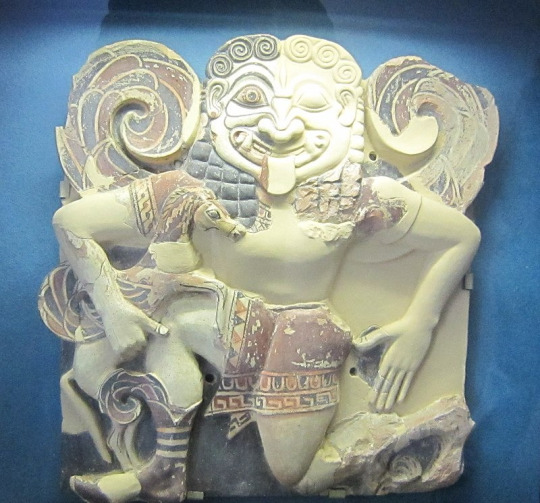


From the 5th century to the 2nd century BCE: A slow evolution as Medusa goes from a full-on monster to a human turned into a monster. As a result the two depictions of the grotesque and beautiful gorgoneion coexist.
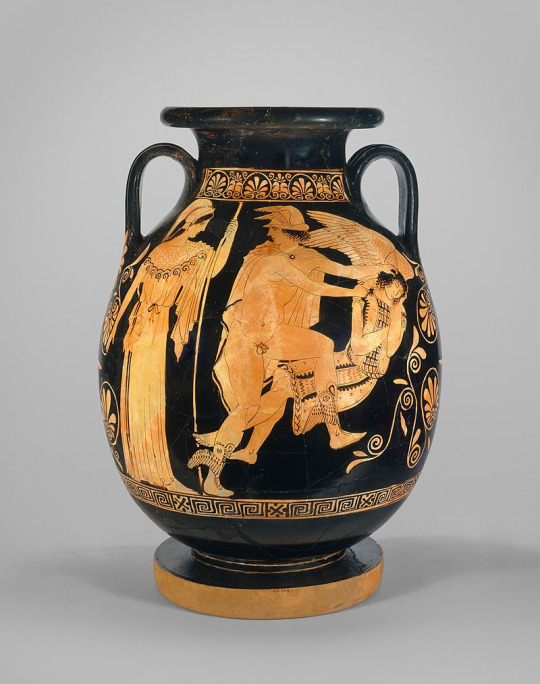


Post 2nd century BCE: Medusa is now a human with snake hair, and just that


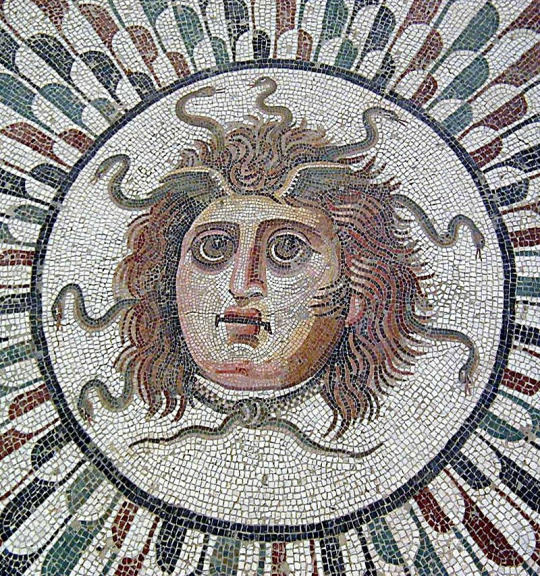
#greek mythology#medusa#gorgon#athena#gorgons#poseidon#neptune#minerva#ovid#rape in mythology#greek monsters#roman mythology
4K notes
·
View notes
Text
"average greek myth involves a god turning someone into something else" factoid actualy just statistical error. average greek myth involves 0 gods turning someone into something else. metamorphoses ovid, who lives in exile & writes over 10,000 transformation myths a day, is an outlier adn should not have been counted.
2K notes
·
View notes
Text











orpheus but he's sisyphus
Ovid’s The Story of Orpheus and Eurydice (tr. Rolfe Humphries) / Spirited Away dir. Hayao Miyazaki / @mag200 / Jenny Diski, “Housewife” / Franz Wright, God's Silence / Adrianne Kalfopoulou, “Poem in Pieces, a Log” / Jon Ware, I am in Eskew / Kazimierz Wierzyński, “A Word of Orphists” (tr. Czeslaw Milosz) / @prisonhannibal / Aeschylus, The Oresteia / Ocean Vuong, Eurydice
image ids under cut:
image 1: a quote from Ovid that reads: "And Orpheus received her, but one term was set: he must not, till he passed Avernus, turn back his gaze, or the gift would be in vain."
image 2: excerpt from the script of the film Spirited Away that reads: "Haku: But I can't go any farther. Just go back the way you came, you'll be fine. [highlighted] But you have to promise not to look back, not until you've passed through the tunnel."
image 3: a drawing, labeled in all-caps handwriting "a venn diagram of love vs. grief:". the drawing is a single circle.
image 4: an excerpt, highlighted and italicized, from Jenny Diski that reads: "People don't understand about repetition, do they? How it is at the heart (thump, thump, thump) of obsession; at the erotic centre (drip, drip, drip) of desire. You do, of course. Repetition is insatiability spelt sideways."
image 5: a quote from Franz Wright reading, "And let me ask you this: the dead, where aren't they?"
image 6: a quote from Adrianne Kalfopoulou in red text, reading, "Grief will keep you reaching back / for what is not there"
image 7: an excerpt from Jon Ware that reads, "Here's my question. If the ghost wants nothing more than to be witnessed, why would it appear behind you, not in front of you? The only answer I can think of is this: [underlined] it appears behind you because it already knows, to an absolute certainty, that you will have no choice but to look back."
image 8: a quote from Kazimierz Wierzyński that reads: "I understood the true fate of Orpheus, that [highlighted] love is a constant terror of loss."
image 9: a screenshot of a tumblr ask from an anonymous user who says, "What's the point?" user prisonhannibal responds, "of what? it's love though".
image 10: two lines from aeschylus reading, "Orestes: This was always going to happen. She's been dead since the beginning."
image 11: an excerpt from Ocean Vuong that reads, "Your absence has gone through me // Like thread through a needle. / Everything I do is stitched with its color."
end ids.
#web weaving#my posts#orpheus#eurydice#love#grief#mythology#poetry#ovid#spirited away#jenny diski#franz wright#adrianne kalfopoulou#jon ware#kazimierz wierzyński#aeschylus#an oresteia#ocean vuong
2K notes
·
View notes
Photo

As punishment for his cruel rejection of the nymph Echo, Nemesis cursed Narcissus to fall in love with his own reflection in a pool of water. Unable to take his eyes away from the beautiful youth he did not recognise as himself, Narcissus stayed by the side of the water until he wasted away.
I’ve been wanting to draw more mythology pieces for a while now! Here is my interpretation of Echo and Narcissus, a Roman myth from Ovid's Metamorphoses.
#Roman mythology#roman myths#Narcissus#Narcissus and Echo#Echo#mythology#myths#greek mythology#greek myths#Ovid#ancient rome#pigeon princess#my art#this was a lot of fun to draw#illustration
5K notes
·
View notes
Text












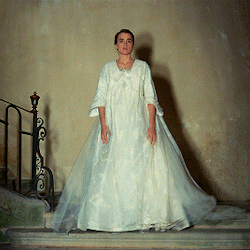


"Dying a second time, now, there was no complaint to her husband (what, then, could she complain of, except that she had been loved?)"
Dead Boy Detectives (2024) / Hadestown (2016) / Portrait de la jeune fille en feu (2019) / Kaos (2024) / Talk - Hozier / Metamorpheses - Ovid
#orpheus and eurydice#riddy#kaos#kaos netflix#hadestown#hadestown musical#portrait of a lady on fire#portrait de la jeune fille en feu#dead boy detectives#dbda#edwin x charles#edwin payne#charles rowland#talk hozier#hozier#ovid#ovid's metamorphoses#metamorphoses#greek mythology#greek myth aesthetic#greek gods#greek myth retellings#mythology#web weave#web weaving#webweaving
358 notes
·
View notes
Text

The Death of Icarus (19th century), (detail), by Alexandre Cabanel (French, 1823-1889), oil on canvas, 44" x 31.5", Private Collection
#the death of icarus#alexandre cabanel#painting#auction#my upload#19th century#academicism#daedalus#icarus#sun#hubris#mythology#greek mythology#mythological painting#painting detail#detail#ovid#ovid's metamorphoses#metamorphoses#art#fine art
487 notes
·
View notes
Text
the theory that ovid lied about being exiled is hilarious. i don't think it could be true but imagine writing about being exiled and how you're so sad and depressed and begging augustus to let you go back home and the entire time you're sitting in your fancy house in the rich people area of rome and augustus is just extremely confused.
1K notes
·
View notes
Text





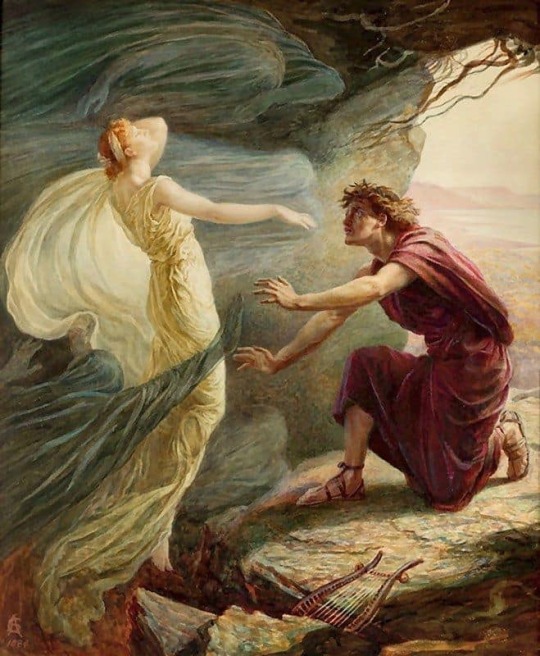


slaughter-house five - kurt vonnegut / orpheus and eurydice - catharine adelaide sparkes / user sawasawako / orpheus mourning the death of eurydice - ary scheffer / metamorphoses - ovid / orpheus and euridice - enrico scuri / talk - hozier / orpheus and eurydice - michel martin drolling
#mine#orpheus#eurydice#orpheus and eurydice#greek mythology#web weaving#dark academia#light academia#dark academic#soft academia#art history#words words words#poetry#kurt vonnegut#slaughterhouse 5#hozier#ovid
5K notes
·
View notes
Text

Thisbe, 1875
Edwin Long
#Thisbe#1870s#Edwin Long#art#art history#painting#Metamorphoses#ovid#literature#roman literature#english art
1K notes
·
View notes
Text

Apollo's lamentation in Ovid's Metamorphoses (Hewitt/Hall trans.)
#hyacinthus#ovid#classics#poetry#tales of queer love from the ancient world#book quotes#kell reads things
358 notes
·
View notes
Text


reading Metamorphoses by Ovid
248 notes
·
View notes
Text
Eurydice, dying now a second time, uttered no complaint against her husband. What was there to complain of, but that she had been loved?
Ovid, Metamorphoses
342 notes
·
View notes
Text




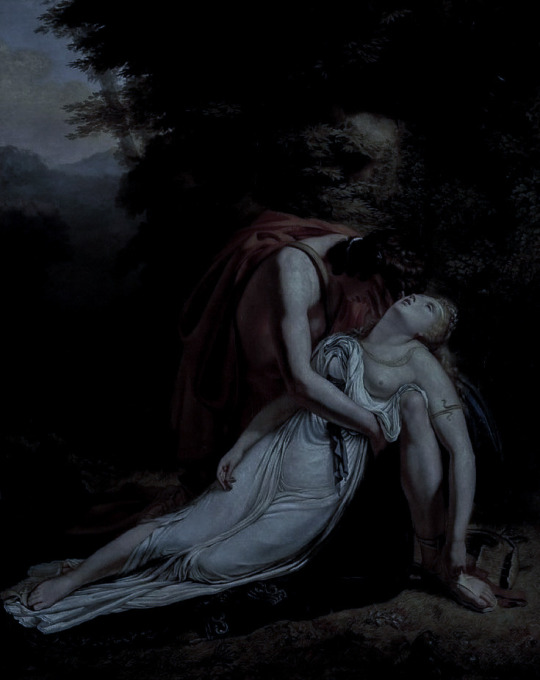














Every devotion is a twisted rope with two ends. Think of a burial.
[despair, supernatural || eurydice, sarah ruhl || eurydice hurried back to the infernal regions, henry thomsom || unkown || orpheus mourning the death of eurydice, ary scheffer || euridice recedes into the underworld, enrico scuri || slaughterhouse-five, kurt vonnegut || all along the watchtower, supernatural || planet of love, richard siken || letters from medea, salma deera || romeo and juliet, william shakespeare || advanced thanatology, supernatural || the oresteia, aeschylus || orpheus and eurydice, carl goos || unkown || metamorphoses, ovid || carry on, supernatural || the death of orpheus, henry leopold levy || do not bring him water, caitlin scarano]
#web weaving#supernatural#spn#dean winchester#castiel#destiel#deancas#dean and cas#orpheus and eurydice#sarah ruhl#william shakespeare#kurt vonnegut#enrico scuri#henry thomsom#carl goos#henry leopold levy#caitlin scarano#ovid#ary scheffer
147 notes
·
View notes
Text
New Greek Myth EP!
My friend from grad school just released her first EP, based on Greek and Roman mythography! She's been working on this for a long time and I'm so excited for people to be able to hear the finished product!
#tagamemnon#greek mythology#mythology#hesiod#theogony#laocoon#ovid#ariadne#patroclus#achilles#patrochilles#eurydice#orpheus#orpheus and eurydice#music#argiope#classics#ancient greek
132 notes
·
View notes
Text
Ingenio maximus, arte rudis.*
Ovid
Maximum ingenuity, raw technique.*
And God created Woman.
1K notes
·
View notes